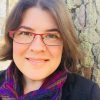This article is more than 5 years old.
I attended the Society of American Archivists annual meeting in Austin, TX, during the first week of August. I was particularly excited about this conference, as it provided me with the opportunity to give a short talk about my research area at the Research Forum and to visit with my grandparents, who have lived near Austin’s Barton Springs for 35 years. This was my first SAA Research Forum, and it was a full day with over 30 full talks and a lightning session. The theme of the forum, Foundations and Innovations, created space for a wide range of topics, from computational archival education to crowdsourcing projects at the Library of Congress. A poster session added to the full array of research activity featured at the Forum.
The opening session of the Research Forum offered highlights from a project created by a former AERI colleague, Dr. Ed Benoit. His work developing the Virtual Footlocker digital platform has provided a research space in which to learn about the personal digital archiving practices and needs of U.S. veterans. Highlights from session 2 include Dr. Richard Marciano’s efforts to support archivists’ education and collaboration in computational methods, an important area of growth for digital archivists.
My presentation (thankfully mid-morning rather than at the beginning or end of the day!) focused on early results from a qualitative study of the digital workflows of independent documentary filmmakers. I’ve spoken with a dozen filmmakers about their digital production, distribution, and preservation/archiving practices, with an eye toward developing a model for curating digital docs. Given the immense amount of footage these artists gather from everyday life, it’s been interesting to hear their perspectives on the preservability of their digital media.
The lightning round featured talks on expedited digital appraisal (MPLP for hybrid collections), collaborations between computer science faculty and archivists, and using a tool called CIRCA for special collections administration. Nance McGovern opened the mid-day session with a compelling argument for something she calls “radical collaboration.” To provide a formal definition from the abstract of the session: “Radical collaboration is a means for coming together across disparate, but engaged, domains in ways that are often unfamiliar or possibly uncomfortable to achieve more together than we could separately.” When info professionals work together on initiatives, we sometimes get stuck in unhelpful or unhealthy communication patterns that undermine true collaboration. McGovern offers some suggestions for how to navigate challenging collaborations that reach across fields or departments:
- Raise awareness through open discussion—listen and assume good intent
- Use inclusive terms (for example, digital practice) and adjust.
- Be aware of using our own lens and our cumulative progress in viewing our past—it’s like saying, “Those dratted people in the ’90s refused to use social media!” before that was possible.
- Balance advocacy and inquiry—determine when to make your case, and when to listen and learn to deepen your awareness and understanding
- Continue from now—facing forward (informed by lessons learned).
Nance argues that open, transparent communication (drawn in part from the radical candor concept that has recently emerged in management literature) can and should be employed in collaborative scenarios alongside intentional listening and a willingness to be open about what we can each bring to a given project. I think this concept could be useful for ZSR in projects that span roles and teams. It’s often helpful not only to engage in planning, but to be mindful and reflective about how we communicate with each other during a project and how we can employ more effective collaboration strategies.
Paul Conway presented on an interesting new tool for institutions engaged in digitization projects. Digitization for Everybody (Dig4E) aims to ensure that anyone trained on digital conversion projects has the same access to current best practices. Training modules and information on standards are provided on a freely available website. In a separate talk, Conway also talked about the state of research in the archival profession generally, noting that much of what we do is evaluation and assessment rather than empirical research, and suggesting that if that approach is our model, that we should coalesce around best practices and standards for doing archival program evaluation. Rather than suggest that we avoid calling ourselves researchers, we should be clear about the types of inquiry in which we are engaged. Evaluation and assessment are important components of library and archives administration, but these activities are distinct from formal research in which hypotheses are tested.
SAA provides a wealth of learning and connecting opportunities; in addition to the research forum, I particularly enjoyed the plenary talk by University of Delaware Vice Provost for Libraries, Trevor Dawes. Section meetings and sessions on managing visual materials, research library collections, and moving images rounded out the weekend. I look forward to the 2020 meeting!

3 Comments on ‘Heather at SAA’
Sounds like it was a great research forum — wish I could have been there!
Your presentation sounds very interesting. I’m reading “Radical Candor” right now. And I also enjoy every presentation I’ve ever seen with Trevor Dawes. There is so much that is current and important in this research form!
The research forum is a great way to go deeply into important topics – glad it was a valuable part of your time at SAA!